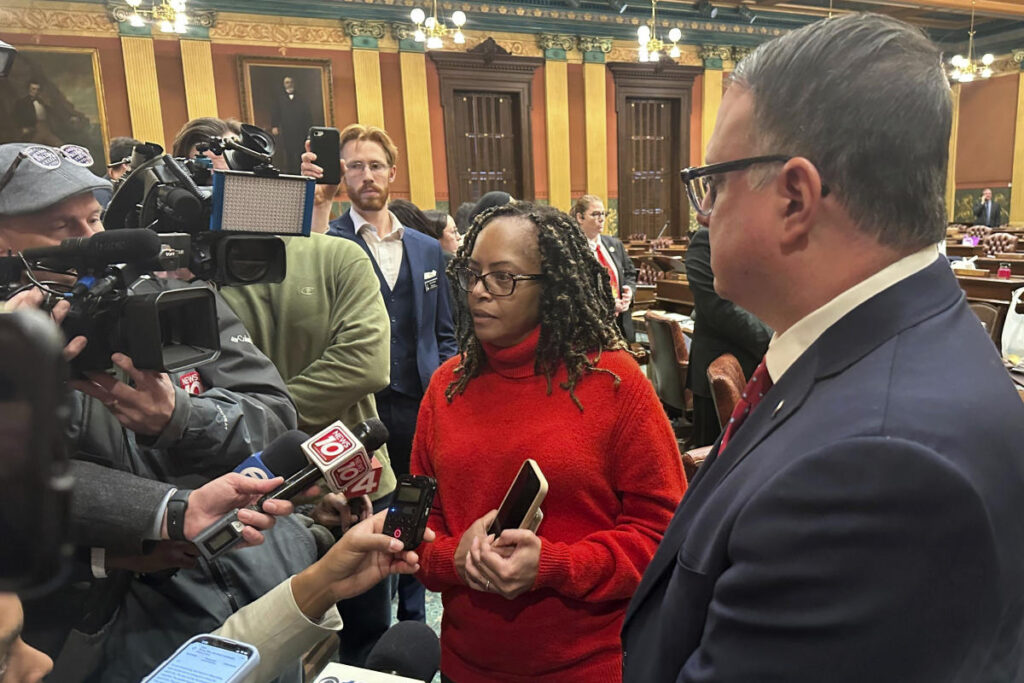In Michigan, the recent tenure of Democratic governance has come to a tumultuous close, characterized by internal rifts and escalating tensions within the party. As Democrats prepared to hand over control of the state House to Republicans, the culmination of the legislative session revealed significant discontent which ultimately led to the suspension of voting on crucial legislative items. This unrest reached a critical point when House Speaker Pro Tem Laurie Pohutsky was compelled to call back absent members but subsequently decided to end the session instead, culminating in the failure of various proposed legislative advancements. The lack of attendance from key Democratic members underscored a deep-seated disillusionment with party leadership, as they expressed grievances about unfulfilled commitments to Black constituents and other marginalized groups.
Amid these setbacks, the narrative of Democratic decline was further fueled by the November general election results, which saw the party losing not only the state House but also the presidential support in Michigan despite having previously been a stronghold for Democratic candidates. The discontent within the Democratic ranks was particularly amplified by criticisms from Black legislators who felt sidelined in policy discussions. State Sen. Sylvia Santana and Detroit Rep. Karen Whitsett were vocal about their frustrations, emphasizing that the party’s failure to address the specific needs of Black voters contributed to the electoral setbacks. The dissatisfaction was evident, as Whitsett openly collaborated with the Republican Minority Leader, criticizing the party’s failure to effectively represent voters.
The internal discord was exemplified by the announcement of Detroit Mayor Mike Duggan, a veteran of the Democratic Party, who declared he would run for governor as an independent in the 2026 election due to the prevalent “partisan, toxic atmosphere” within the state government. Such a declaration highlighted the growing perception of dysfunction within the Democratic leadership. Governor Gretchen Whitmer, also from the Democratic Party and in her second term, signaled her frustrations, declaring that she would not endorse or sign bills unless her administration’s priorities, including increased funding for economic projects, were adequately addressed. This insistence on specificity showcased the increasing demands from party leadership within the state as they sought to retain a level of control amid the political upheaval.
Senate Majority Leader Winnie Brinks expressed her dissatisfaction over the House’s inability to conclude legislative obligations, suggesting that the far-reaching impacts of the session’s termination could be detrimental to the state at large. “Frustrated” was an understatement according to Brinks, and it reflected broader concerns about the direction of legislative priorities stymied by party strife. With significant items on the agenda, such as measures to expand public records access and restrictions on ghost guns and protection for reproductive health data falling by the wayside, the implications of the Democrats’ failure to assert legislative power were acute. Regardless of party affiliation, many observers voiced disappointment over the legislative inertia, questioning leadership decisions amidst critical issues facing Michigan residents.
In the midst of this turmoil, party leaders sought to maintain a façade of unity amidst antagonism. Behind the scenes, Democrat leaders pointed fingers at absentee Republicans, accusing them of negligence in their duties. House Democratic leadership remained adamant in denying any schism within their ranks. Attorney General Dana Nessel took aim at Rep. Whitsett and House Republicans, labeling their absences “criminal,” a remark that ignited backlash from members across the political spectrum, serving only to deepen the degree of division rather than quell it. Republicans’ refusal to participate further exacerbated tensions in the already fraught political landscape, signaling a retreat from collaboration that could affect policy-making in the coming years.
As the House prepares to change hands in January, the incoming Republican majority leader, Matt Hall, promised a renewed commitment to working alongside Democrats and treating opposition members with respect. His remarks reflected a hope for a more cooperative environment in contrast to the past two years of Democratic governance marked by division and conflict. However, the underlying issues stemming from the Democratic leadership’s handling of legislative priorities will undoubtedly loom large as Republicans reclaim control. The implications of these transitions will likely shape the course of Michigan’s legislative future, presenting both challenges and opportunities as the parties navigate a tense political landscape characterized by voter disenchantment and rising demands for accountability.

